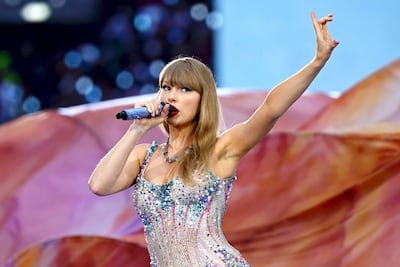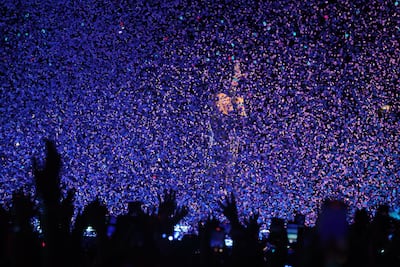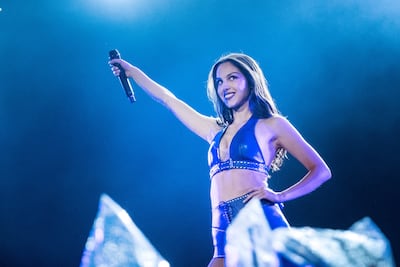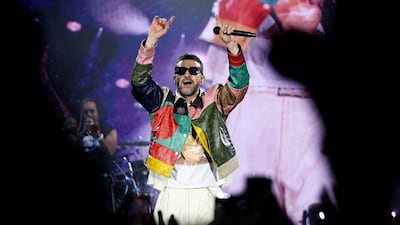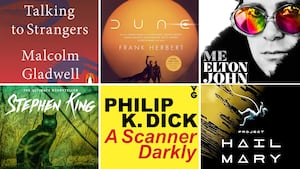Justin Timberlake's Forget Tomorrow World Tour ends today in Istanbul but, judging by the backlash, it couldn't have come to a close soon enough.
What was billed as an anticipated comeback instead exposed how six years away from the road seems to have left the Cry Me a River singer out of touch with what's expected from a modern touring artist. The old assumptions – that sheer star power, a dependable setlist of hits and audiences primed to lap up whatever's presented on stage would suffice – are gone.
For Timberlake, the fall was more than cancelled shows or the occasional bum note. It was about violating what has become an unspoken yet cardinal rule of live music: concerts are no longer solo performances but communal experiences, and it's the crowd that determines if a show succeeds.
The Istanbul outing comes on the back of a growing catalogue of widely shared social media clips, from Dublin, Bucharest and London, showing disgruntled fans accusing Timberlake of delivering half-hearted performances.
In one viral video that has received more than 460,000 likes, a Romanian fan lamented that she paid “a lot of money” to see him, only to feel “disrespected” by a show where he appeared to skulk around the stage in a low-brimmed hat, barely engaging with the crowd.
While Timberlake isn't the first artist accused of phoning it in, the emotional, almost visceral response reveals a new faultline in the touring industry.
In a concert economy where fans are spending hundreds, sometimes thousands of dollars for tickets, merchandise and premium meet-and-greet packages, the expectation is no longer just a solid setlist. It's that the artist will show up emotionally and meet the crowd in that shared space. Timberlake didn't just deliver a lacklustre show. He did something worse: he disengaged.
A glance at today’s most successful tours reveals artists who understand that concerts are no longer just musical events, but shared platforms.
Taylor Swift’s record-breaking Eras Tour, now officially the biggest and most commercially successful concert tour of all time with over $2 billion in revenue, is a case in point.
More than a three-and-a-half-hour showcase of Swift's catalogue, each show was a colourful world-building exercise. Fans arrived in co-ordinated outfits, exchanged official friendship bracelets and chanted lyrics at predesignated cues. The ecstatic crowd left not as audience members, but as active participants.
That same mastery of crowd choreography was on full display during Coldplay’s four sold-out shows at Abu Dhabi’s Zayed Sports City Stadium. As The National's review noted of a detail as simple but powerful as the LED wristbands: “The Xylobands, shifting from cherry red to soft tea green, created a cascading effect as the crowd waved their arms, making it seem as though singer Chris Martin was strolling through a dark, enchanted forest.”
The change in expectations also requires, at times, a counterintuitive approach from artists. Where before the ultimate aim was to deliver the best vocal performance, now making the occasional slip-up is not meant to be hidden, but to be part of the show.
Singer Olivia Rodrigo, whose songs are defined by their adolescent vulnerability, leans into that communal intimacy. Her vocal stumbles, also relentlessly documented by fans online during her well-received tour, become shared moments of recognition by fans who praise her in these videos for being real. “You feel like she's your friend, not a pop star,” one fan posted recently under a social media video of Rodrigo's Glastonbury festival performance in June.
And when Oasis reunited this July after 16 years, the press and the crowd didn't care about how polished they sounded or even so much the fact that Noel and Liam Gallagher were back on stage again, but about how their presence and songs made the stadium feel.
This shift in audience expectation is partly driven by economics. The fact is, we are paying more than ever for concert tickets. In North America, ticket prices soared by more than 41 per cent since 2019, according to trade publication Pollstar. While there is no regional data, The National’s coverage of UAE concerts dating back to 2013 showed a general admission to see Black Sabbath at Etihad Park starting from Dh295, while tickets to see British singer David Gray at Dubai’s Coca-Cola Arena in October and Rod Stewart at Abu Dhabi’s Etihad Arena are both Dh395.
And yet, people are still buying while jettisoning the now outdated idea of “fear of missing out” for “you had to be there”. It is about the event being larger than the music itself, a catalyst for community, making friends, expressing yourself with handmade memorabilia, and sharing a memory that is resonant because it felt real and made for the occasion. That is the emotional return on investment fans are seeking. And that is what Timberlake, by all visible accounts, failed to deliver.
His tour featured none of the crowd participation cues that audiences have come to view as signs of care. There was also reportedly no off-the-cuff banter, rather the shows were viewed as lacking authentic moments and spontaneity.
Perhaps this would have been OK if the music critic's pen still carried weight in shaping public perception, but that mantle has now moved to social media platforms. Fan reactions, often posted while the show is running, are now the ultimate definer of whether a performance is a hit or a dud.
If Rodrigo's voice cracks mid-set, it's viewed as a loving reminder of her authenticity. If Timberlake delivers a smooth yet emotionally detached version of Suit & Tie, it becomes an unflattering meme.
The new, unwritten contract understandably demands much from the artist – each show needs to feel like it was made for the moment while being cognisant that it could be recorded for posterity.
It's a new form of the purity test, where an artist must now be many things on stage: performer, therapist, community builder and content generator. They must be professional yet not too polished, emotionally present but always ready to strike the right pose for crowds looking for social media content.
It is no wonder Timberlake has reportedly been unhappy on the road. The game has changed, but he has yet to.
Hydrogen: Market potential
Hydrogen has an estimated $11 trillion market potential, according to Bank of America Securities and is expected to generate $2.5tn in direct revenues and $11tn of indirect infrastructure by 2050 as its production increases six-fold.
"We believe we are reaching the point of harnessing the element that comprises 90 per cent of the universe, effectively and economically,” the bank said in a recent report.
Falling costs of renewable energy and electrolysers used in green hydrogen production is one of the main catalysts for the increasingly bullish sentiment over the element.
The cost of electrolysers used in green hydrogen production has halved over the last five years and will fall to 60 to 90 per cent by the end of the decade, acceding to Haim Israel, equity strategist at Merrill Lynch. A global focus on decarbonisation and sustainability is also a big driver in its development.
Tips to stay safe during hot weather
- Stay hydrated: Drink plenty of fluids, especially water. Avoid alcohol and caffeine, which can increase dehydration.
- Seek cool environments: Use air conditioning, fans, or visit community spaces with climate control.
- Limit outdoor activities: Avoid strenuous activity during peak heat. If outside, seek shade and wear a wide-brimmed hat.
- Dress appropriately: Wear lightweight, loose and light-coloured clothing to facilitate heat loss.
- Check on vulnerable people: Regularly check in on elderly neighbours, young children and those with health conditions.
- Home adaptations: Use blinds or curtains to block sunlight, avoid using ovens or stoves, and ventilate living spaces during cooler hours.
- Recognise heat illness: Learn the signs of heat exhaustion and heat stroke (dizziness, confusion, rapid pulse, nausea), and seek medical attention if symptoms occur.
Dengue%20fever%20symptoms
%3Cp%3EHigh%20fever%20(40%C2%B0C%2F104%C2%B0F)%3Cbr%3ESevere%20headache%3Cbr%3EPain%20behind%20the%20eyes%3Cbr%3EMuscle%20and%20joint%20pains%3Cbr%3ENausea%3Cbr%3EVomiting%3Cbr%3ESwollen%20glands%3Cbr%3ERash%26nbsp%3B%3C%2Fp%3E%0A
One in nine do not have enough to eat
Created in 1961, the World Food Programme is pledged to fight hunger worldwide as well as providing emergency food assistance in a crisis.
One of the organisation’s goals is the Zero Hunger Pledge, adopted by the international community in 2015 as one of the 17 Sustainable Goals for Sustainable Development, to end world hunger by 2030.
The WFP, a branch of the United Nations, is funded by voluntary donations from governments, businesses and private donations.
Almost two thirds of its operations currently take place in conflict zones, where it is calculated that people are more than three times likely to suffer from malnutrition than in peaceful countries.
It is currently estimated that one in nine people globally do not have enough to eat.
On any one day, the WFP estimates that it has 5,000 lorries, 20 ships and 70 aircraft on the move.
Outside emergencies, the WFP provides school meals to up to 25 million children in 63 countries, while working with communities to improve nutrition. Where possible, it buys supplies from developing countries to cut down transport cost and boost local economies.
Vidaamuyarchi
Director: Magizh Thirumeni
Stars: Ajith Kumar, Arjun Sarja, Trisha Krishnan, Regina Cassandra
Rating: 4/5
NYBL PROFILE
Company name: Nybl
Date started: November 2018
Founder: Noor Alnahhas, Michael LeTan, Hafsa Yazdni, Sufyaan Abdul Haseeb, Waleed Rifaat, Mohammed Shono
Based: Dubai, UAE
Sector: Software Technology / Artificial Intelligence
Initial investment: $500,000
Funding round: Series B (raising $5m)
Partners/Incubators: Dubai Future Accelerators Cohort 4, Dubai Future Accelerators Cohort 6, AI Venture Labs Cohort 1, Microsoft Scale-up
Iftar programme at the Sheikh Mohammed Centre for Cultural Understanding
Established in 1998, the Sheikh Mohammed Centre for Cultural Understanding was created with a vision to teach residents about the traditions and customs of the UAE. Its motto is ‘open doors, open minds’. All year-round, visitors can sign up for a traditional Emirati breakfast, lunch or dinner meal, as well as a range of walking tours, including ones to sites such as the Jumeirah Mosque or Al Fahidi Historical Neighbourhood.
Every year during Ramadan, an iftar programme is rolled out. This allows guests to break their fast with the centre’s presenters, visit a nearby mosque and observe their guides while they pray. These events last for about two hours and are open to the public, or can be booked for a private event.
Until the end of Ramadan, the iftar events take place from 7pm until 9pm, from Saturday to Thursday. Advanced booking is required.
For more details, email openminds@cultures.ae or visit www.cultures.ae
The biog
Favourite Emirati dish: Fish machboos
Favourite spice: Cumin
Family: mother, three sisters, three brothers and a two-year-old daughter
How much do leading UAE’s UK curriculum schools charge for Year 6?
- Nord Anglia International School (Dubai) – Dh85,032
- Kings School Al Barsha (Dubai) – Dh71,905
- Brighton College Abu Dhabi - Dh68,560
- Jumeirah English Speaking School (Dubai) – Dh59,728
- Gems Wellington International School – Dubai Branch – Dh58,488
- The British School Al Khubairat (Abu Dhabi) - Dh54,170
- Dubai English Speaking School – Dh51,269
*Annual tuition fees covering the 2024/2025 academic year
'The worst thing you can eat'
Trans fat is typically found in fried and baked goods, but you may be consuming more than you think.
Powdered coffee creamer, microwave popcorn and virtually anything processed with a crust is likely to contain it, as this guide from Mayo Clinic outlines:
Baked goods - Most cakes, cookies, pie crusts and crackers contain shortening, which is usually made from partially hydrogenated vegetable oil. Ready-made frosting is another source of trans fat.
Snacks - Potato, corn and tortilla chips often contain trans fat. And while popcorn can be a healthy snack, many types of packaged or microwave popcorn use trans fat to help cook or flavour the popcorn.
Fried food - Foods that require deep frying — french fries, doughnuts and fried chicken — can contain trans fat from the oil used in the cooking process.
Refrigerator dough - Products such as canned biscuits and cinnamon rolls often contain trans fat, as do frozen pizza crusts.
Creamer and margarine - Nondairy coffee creamer and stick margarines also may contain partially hydrogenated vegetable oils.
Groom and Two Brides
Director: Elie Semaan
Starring: Abdullah Boushehri, Laila Abdallah, Lulwa Almulla
Rating: 3/5
